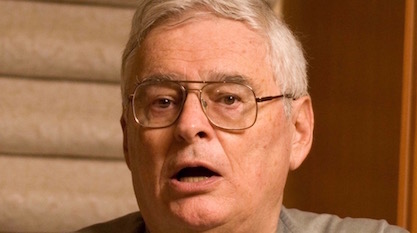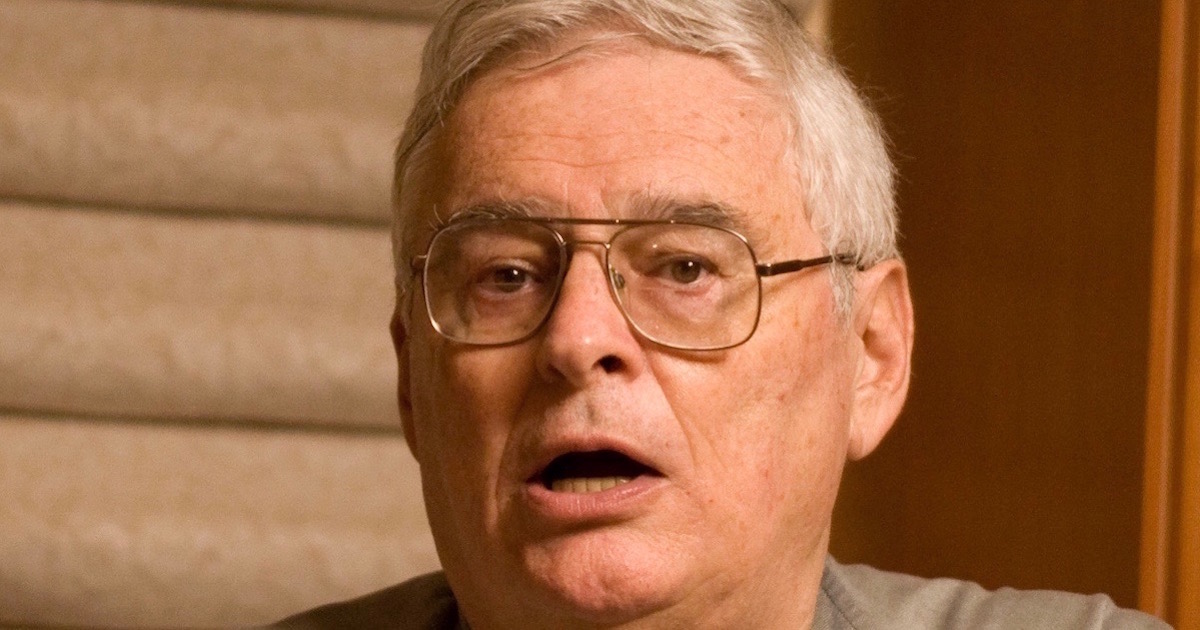 Evolution
Evolution
 Intelligent Design
Intelligent Design
Can the Rot of Naturalism Be Stopped? Relating Information to Matter and Energy Might Help


A New Yorker obit for naturalist atheist philosopher Jerry Fodor (1935–2017), who risked doubting Darwin, noted Fodor’s dismissal of the “natural selection” cult but, surprisingly, did not offer polite contempt. Obituarist Stephen Metcalf merely observed, “Fodor thought that the neo-Darwinists had confused the loyalty oath of modernity — nature is without conscious design, species evolve over time, the emergence of Homo sapiens was without meaning or telos — with blind adherence to the fallacy known as ‘natural selection.’”
It seems that the oath one must take is not, after all, to the current demands of the Darwin lobby but to naturalism itself (nature is all there is) as a guiding universal principle. As naturalism slowly becomes our state religion, it is helpful to have our obligations spelled out that way.
In practice, Fodor’s reasoned dissent will likely be suppressed in popular science media, roughly as Karl Popper’s was, the way one omits to mention the sins of the late and great. As it happens, dissent from Darwinism, the creation story of naturalism, has not died. Increasingly, it arises from respectable sources: Kevin Laland and J. Scott Turner come to mind. Arlin Stoltzfus tells us that Darwinism is now “thoroughly detached” from its historical roots as a falsifiable theory and “must be abandoned” (Biology Direct, 2017). Incidentally, Darwinian eminence Ford Doolittle, who cheered Stolfus on, has in the past justified mental gymnastics to defend Darwinism (2009). Back then he said that “much is at stake socio-politically,” namely the need to defeat “anti-evolutionists” in “the culture wars.”
Yes, that’s the trouble. Post-modernism makes facts a mere culture war. Even the current dissent from Darwinism is simply not much addressed in popular science media because, however naturalist the dissent might be, it could be mistaken for a violation of the “oath of modernity.” Today, statements need not even make sense so long as they are fully naturalist. We are told at Forbes, for example, that there is no such thing as proof in science but that “evolution” is “eminently valid,” which means that in a world without certainties, the claims made by evolution’s proponents are nonetheless inviolable.
Darwinism is, of course, only a flashpoint. Its unaddressed problems with logic and evidence are part of a more general pattern of flight from evidence. On that account, many people hope to just toss evolution to the naturalists and get on with things elsewhere in science. Not so fast. Naturalism has always aspired to be a complete explanation for everything, not just for the development of life. If anything at all is not naturalist, the whole edifice crumbles. The summation of all things is to be a closed Grand Unified Theory (GUT), “perhaps the most difficult endeavor in physics,” which may not even be possible. Possible or not, it is, at heart, a metaphysical project. Particle physicist JoAnne Hewett explains that a demonstrable GUT “would affect how every person would think about the world….Everybody can understand that we’re made out of protons and ‘Oh wow! They decay.’” That’s the ultimate truth we are to understand, decay.
Even mathematics, traditionally treated as a non-naturalist concept like consciousness, must be naturalized as a product of chance. If that approach voids mathematics, so much the worse for the discipline.
A century ago, naturalists were modernists, and thus proud “rationalists.” They were for reason and against superstition. But their creation story, Darwinian evolution, demands that reason be seen as an illusion that passes on our genes, and those demands were heard. Post-modernists have moved first slowly, but now quickly, into the breach, attacking basic principles of science and medicine, and even threatening the safety of science teachers. On a modernist view, the science teacher was thought to be more “objective” and thus not usually a target. But post-modernism has made objectivity itself a suspicious concept.
One gets the sense that the current science establishment is still largely modernist, at least in its sympathies. It would like to believe in the core tenets of science as somehow real. But to the extent that naturalism makes such tenets an illusion in principle, the establishment cannot mount defenses even against its own incoherence, let alone others’. Popular culture lobbies now appeal to science to support a tangle of conflicting, sometimes incoherent claims. For example, with respect to sexuality, biology, environment, and personal choice must all rule alone but all must rule at once. Lobbies with such competing, irreconcilable claims need not fear elite criticism of their incoherence today because today’s elite no longer represents reason. It is merely an establishment social power in a world without coherence.
The only perceived threat is non-naturalism, the idea that some things may not be a product of chance. Now we learn that the Pentagon has been funding a UFO detection program for years: “On CBS’s ‘60 Minutes’ in May, Mr. Bigelow [whose company was the main beneficiary] said he was ‘absolutely convinced’ that aliens exist and that UFOs have visited Earth” (New York Times). No, there is no serious evidence for the alien visitors. But if NASA were to suggest that the universe shows evidence of design, for which there is massive evidence, almost the entire science elite would be in arms against the agency. Evidence, it seems, is just not a thing anymore. And prominent synthetic chemist James Tour can quote Dostoevsky to the effect that he wonders why “everyone is lying” about the origin of life without causing a ripple because lying, provided it defends naturalism, is also not a thing anymore.
As always, some seek a middle way. Theoretical physicist Sabine Hossenfelder says she has always felt that science is simply “what scientists do.” The problem is, while post-modern science is indeed one of many “communities of practice,” as she puts it, so is water witching. Science groups can’t take refuge in the mere right to exist and also expect legitimate authority and public support.
Sensing the trouble ahead, Hossenfelder also worries that “if we in academia don’t fix our problems soon, someone else will. And I don’t think we’ll like it.” It’s worse than that, Dr. Hossenfelder. No outsider can fix them. Some reforms must come from a recommitment to enduring survival values from within. In this case, members of the “community of practice” must recommit to the independent reality of an order beyond nature, even if that independent reality is only logic or mathematics, or Plato’s forms.
There is no escape from this trap inside naturalism. Displays of political power could curtail the worst and most ridiculous excesses of post-modernism if the will existed. But the will doesn’t exist. Science authorities choose to obsess about what non-naturalists think. Here’s a classic: Intellectual freedom to question Darwinism is considered “anti-science.” A cottage industry of social science papers offers accounts of why we doubt the consensus or, as some would put it, hate science. All this comes at a time when Times Higher acknowledges that peer review (one of the “gold standards” of science), is an “ineffective and unworthy” institution, “self-evidently useful in protecting established paradigms and disadvantaging challenges to entrenched scientific authority.” Or even “unscientific” (Nature, 2016). But the science establishment senses no conflict because coherence is not necessary today and a key naturalist assumption is that we have not evolved so as to perceive evidence correctly. The bottom line: Right or wrong, coherent or not, the science establishment, slowly going post-modern, is justified because it has more power than the average citizen.
Philosopher of consciousness John Searle identified this underlying theme of post-modernism in Mind, Language and Society: Philosophy in the Real World (2008): “[I]t satisfies a basic urge to power. It just seems too disgusting, somehow, that we should have to be at the mercy of the ‘real world.’” If consciousness is an illusion, the comfort is that there is no “real world” anyway, just the one we insist on.
So What Difference Does ID Make?
Science may not survive this. For one thing, science opinion leaders are themselves putting failing claims beyond the reach of disconfirmation by evidence. If design proponents did nothing but confront that fact, in the face of tenured nihilists and Wikipedian trolls, it would be a job worth doing. But they are doing some other things as well.
ID is first and foremost an insistence that evidence matters, underwritten by a conviction that reason-based thinking is not an illusion. That means, of course, accepting fine-tuning as a fact like any other, not to be explained away by equating vivid speculations and splendid casuistries with facts. Second, ID theorists insist that the information content of our universe and life forms is the missing factor in our attempt to understand our world. Information may be the basis of everything or space and time may spring from information (“It from Qubit”). Or it might be the only thing that exists.
It’s hard to know because information has so far mainly been the Cinderella of philosophy. Luciano Floridi offers, “We have always relied on Cinderella working hard in the house of philosophy. It is time to acknowledge her great services.”
Not so fast. If we recall the tale, Cinderella was not supposed to be a servant. She can be misrepresented but not dismissed. However, dealing with her on equal terms with her stepsisters risks introducing non-naturalism (nature is not all there is) as a legitimate view.
Right now, any alternative is currently deemed permissible, including the faint-hope drive to consider information physical. One doubts that either matter or energy will fit into information’s slipper. But understanding the relationship between information on the one hand and matter and energy on the other is an essential next discovery, one that could found concepts like mathematics and consciousness as real once again.
That discovery will happen eventually, of course. But it might not be in our culture; perhaps in a later one. That’s a stark choice for our day. Periods of great discovery are often followed by centuries of doldrums. The declines are usually based on philosophical declines, like the one we are seeing now.
Photo: Jerry Fodor, by Pealco [Public domain], via Wikimedia Commons.
